
In the botanical classification of plants, Aeridinae Pfitzer is a subtribe of the tribe Vandeae whose representatives all have a monopodial growth habit and do not possess pseudobulbs.

Vanda, abbreviated in the horticultural trade as V., is a genus in the orchid family, Orchidaceae. There are 90 species, and the genus is commonly cultivated for the marketplace. This genus and its allies are considered to be among the most specifically adapted of all orchids within the Orchidaceae. The genus is highly prized in horticulture for its showy, fragrant, long-lasting, and intensely colorful flowers. Vanda species are widespread across East Asia, Southeast Asia, and New Guinea, with a few species extending into Queensland and some of the islands of the western Pacific.

Phalaenopsis stobartiana, also known as 滇西蝴蝶兰 in Chinese, is a species of epiphytic plant in the family Orchidaceae. It is endemic to Hainan, China. The specific epithet stobartiana refers to William Culley Stobart. The Stobart family were the principal landowners and colliery owners in the 19th century in England.
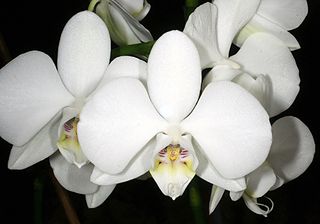
Phalaenopsis amabilis, commonly known as the moon orchid, moth orchid, or mariposa orchid, is a species of flowering plant in the orchid family Orchidaceae. It is widely cultivated as a decorative houseplant. It is an epiphytic or lithophytic herb with long, thick roots, between two and eight thick, fleshy leaves with their bases hiding the stem and nearly flat, white, long-lasting flowers on a branching flowering stem with up to ten flowers on each branch.

Rhynchostylis is a genus in the orchid family (Orchidaceae), closely allied to the genus Vanda and comprising four currently accepted species native to the Indian Subcontinent, China, Indochina, Malaysia, Indonesia and the Philippines.

Phalaenopsis taenialis, also known as 小尖囊蝴蝶兰 in Chinese, is a species of epiphytic orchid occurring from the eastern Himalaya to China (Yunnan). The specific epithet taenialis is derived from the long, flattened roots, which resemble tapeworms. The specific epithet taenialis, from the Latin taenia, means ribbon or band.
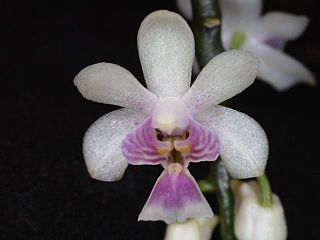
Phalaenopsis deliciosa is a species of orchid occurring from the Indian subcontinent to Malesia and China. The species is a miniature epiphytic herb. The leaves are unique due to their undulate margins. This characteristic greatly simplifies the identification of the species, even when specimens are not currently flowering. The small flowers are usually slightly pink, but white and yellow forms exist as well. Old inflorescences, which are usually panicles or more rarely racemes, may continue to grow and form new flowers over several flowering periods.

Phalaenopsis gigantea is a species of orchid endemic to the island of Borneo and was first described in 1909. The specific epithet gigantea refers to the giant size of its leaves, which can grown over 60 cm in length on a mature plant. It is the largest known Phalaenopsis species.

Phalaenopsis × intermedia, the intermediate phalaenopsis, is a natural occurring hybrid of epiphytic orchid endemic and most commonly seen orchid species in the Philippines. A progeny of Phalaenopsis aphrodite and P. equestris, this orchid thrives in the heat of the lowlands, in primary and secondary forests at an altitude of sea level to 300 meters where it blooms all year round. Unlike other natural hybrid within the genus, P. × intermedia is seldom found growing within the range of its parent species and has formed sexually reproducing, stable populations in the wild. All red-lipped Phalaenopsis have pedigrees that can be traced back to this orchid.

Phalaenopsis difformis, also known as the dark brown Phalaenopsis, is a species of epiphytic orchid native to Assam, Borneo, China South-Central, China Southeast, East Himalaya, Laos, Malaya, Myanmar, Bangladesh, Nepal, Sumatera, Thailand, Vietnam and West Himalaya.
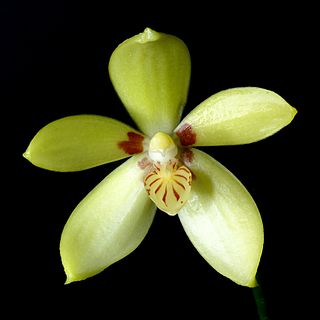
Phalaenopsis cochlearis is a species of orchid native to peninsular Malaysia to Borneo.
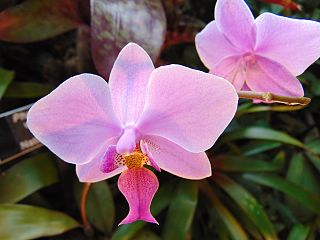
Phalaenopsis × veitchiana is a species of orchid endemic to the Philippines. It is a hybrid of Phalaenopsis equestris and Phalaenopsis schilleriana. It occurs naturally and has also been artificially re-created. It is named after the British horticulturalist Harry J. Veitch.

Phalaenopsis javanica is a species of orchid native to Java and Sumatra. The specific epithet javanica refers to the Indonesian island Java.

Phalaenopsis modesta is a species of orchid endemic to Borneo. The specific epithet modesta, from the Latin modestus, means unassuming, moderate or modest.

Phalaenopsis × singuliflora is a species of orchid native to Borneo. It is a natural hybrid of Phalaenopsis bellina and Phalaenopsis sumatrana. Its name singuliflora is derived from the consecutively produced flowers.

Phalaenopsis × amphitrite is a species of orchid native to the Philippines. It is a natural hybrid of Phalaenopsis sanderiana and Phalaenopsis stuartiana.

Phalaenopsis × gersenii is a species of orchid native to Borneo and Sumatra. It is a natural hybrid of Phalaenopsis violacea and Phalaenopsis sumatrana. It is named after Gerrit Jan Gersen (1826-1877). He was a Dutch official, who was deployed to the Dutch East Indies, where he also was active as a plant collector of the Malesian region.

Phalaenopsis × leucorrhoda is a species of orchid native to the Philippines. It is a natural hybrid of Phalaenopsis aphrodite and Phalaenopsis schilleriana.
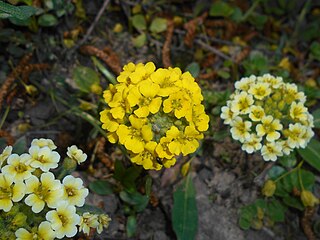
Alyssum wulfenianum, the madwort, is a species of flowering plant in the family Brassicaceae, native to the southeastern Alps. Preferring dry, porous soils, it is hardy in USDA zones 4 through 9. There is a cultivar, 'Golden Spring'.
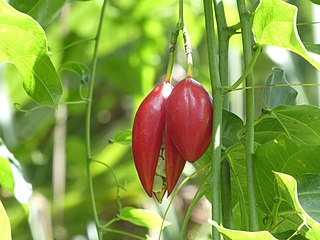
Adenia heterophylla, commonly known in Australia as the lacewing vine, is a climbing plant in the family Passifloraceae. It has a broad distribution spanning the equator, from the south eastern corner of China, through Indochina and Malesia, to northern Australia. In Australia it serves as a food plant for larvae of the glasswing, red lacewing and cruiser butterflies.




















